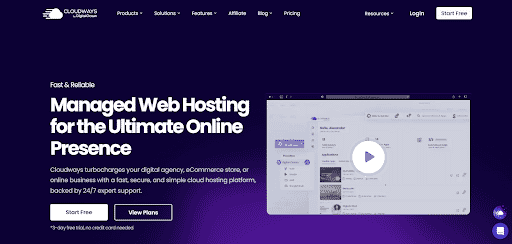

Hostinger vs Cloudways vs Dreamhost: Which One Is the Best Web Hosting for Your Website

Let’s be real – choosing a web hosting provider in 2025 isn’t as simple as just picking the cheapest option or going with the most advertised name. Your hosting directly impacts your website’s speed, uptime, security, and even SEO rankings.
And if you’re thinking, “How much can it really affect?” – here’s a stat for you:
A 1-second delay in website load time can result in a 7% reduction in conversions.
That means if your hosting isn’t up to the mark, you’re potentially losing customers before they even see your homepage.
Whether you’re launching your first blog, running an eCommerce site, or managing client websites, the right host is the foundation of everything. And with so many options out there, it’s easy to feel overwhelmed.
So, we’ve put three of the most talked-about names in web hosting head-to-head:
Hostinger, Cloudways, and DreamHost.
In this blog, we will discuss:
- A quick overview of Hostinger, Cloudways, and DreamHost
- What makes each one different is its core offerings and approach
- Who should use which, based on real-world use cases
- The pros and cons of each platform
- How to choose the right hosting for your specific needs
- What to do after picking a host, so you’re not stuck wondering what’s next
And yes, we’ll also share real user reviews from platforms like G2, Trustpilot, and Reddit so you can hear straight from people who’ve actually used these hosts
By the end, you’ll know exactly which one suits your website needs, without the tech jargon.
Quick Overview of Hostinger, Cloudways & DreamHost
Before diving into comparisons, let’s get familiar with the three hosting providers we’ll be talking about, especially if you’re new to web hosting. Each of these platforms has a different personality, a different ideal user, and a different kind of power under the hood.
Let’s break it down.
1. Hostinger

Hostinger is a great first step into the world of web hosting. It’s lightweight, user-friendly, and offers all the basics you need to get a site live, without spending too much or getting overwhelmed.
When you log in, you’re greeted with their custom dashboard (hPanel), which is built for non-techies. Want to install WordPress? It’s one click. Want to set up email? A few more clicks. The interface guides you through everything like a friendly assistant.
Performance-wise, Hostinger actually holds up better than expected for its price point. In speed tests, their shared hosting servers deliver an average global response time of ~470ms, which is better than many competitors in the same price tier. That’s fast enough to keep most casual visitors happy, hustlers, and small businesses who want to launch fast with minimal effort.
- Ideal for: Beginners, bloggers, portfolios, small businesses
- Known for: Easy setup, affordable pricing, reliable for lightweight sites
- Keep in mind: Limited customization and scaling for larger projects
Ratings:
- Trust Pilots: 4.7⭐
- Capterra: 4.5 ⭐
- Website Planet: 4.9⭐
2. Cloudways

Cloudways isn’t your traditional plug-and-play host, and that’s what makes it powerful. Instead of owning the physical servers, Cloudways lets you launch your website on the infrastructure of top cloud providers like DigitalOcean, AWS, or Google Cloud. You pick the cloud, and Cloudways manages the hard stuff for you.
It’s like hiring a pit crew to run your race car; you still control how it drives, but the engine is way more powerful than standard shared hosting.
In reliable independent testing over 12 months (January – December 2024), Cloudways on DigitalOcean recorded an average TTFB (time to first byte) of 405 ms and maintained 99.99% uptime, including just 43 minutes of downtime for premium plans and around an hour for standard plans.
- Ideal for: Developers, fast-growing startups, performance-first businesses
- Known for: Speed, scalability, advanced features
- Keep in mind: Not built for complete beginners; no domain or email service included
Ratings:
- Trust Pilots: 4.5⭐
- Capterra: 4.3 ⭐
- Website Planet: 4.6⭐
- G2: 4.7 ⭐
3. DreamHost

Now that you’ve seen Hostinger (the beginner-friendly starter) and Cloudways (the performance-focused option), let’s take a look at DreamHost — a dependable middle-ground solution.
DreamHost doesn’t chase flashy features or ultra-low prices. Instead, it offers predictable, long-term hosting with a focus on transparency and ease of use. You won’t find surprise renewal fees or constant upsell prompts. Instead, their plans include essential tools by default, such as free WHOIS domain privacy, automated daily backups, and basic security scanning.
Plus, DreamHost is one of the few hosts officially recommended by WordPress.org, making it a solid choice for content-driven websites.
When it comes to reliability, DreamHost performs well for standard use cases. According to Quick Sprout’s 2025 uptime study, DreamHost achieved an average 99.95% uptime, putting it among the more dependable hosts on the list
- Ideal for: Bloggers, creatives, nonprofits, privacy-focused users
- Known for: WordPress support, transparent pricing, free privacy protection
- Keep in mind: UI may feel a bit outdated; support is not instant but generally responsive
Ratings:
- Trust Pilots: 4.7⭐
- Capterra: 4.3 ⭐
- Website Planet: 4.4⭐
- G2: 4.0 ⭐
Hostinger vs Cloudways vs DreamHost: Comparison Table
| Feature / Factor | Hostinger | Cloudways | DreamHost |
| Ease of Use | Very beginner-friendly (hPanel) | For developers and advanced users | Simple, but the UI feels a bit dated |
| Setup Time | 1-click WordPress, set up in minutes | Manual steps require an understanding of the cloud setup | Straightforward, but not as guided |
| Speed & Performance | Good for price (~470ms avg response time)* | Excellent; fast load times and scaling on demand** | Stable performance (~99.95% uptime)*** |
| Uptime Guarantee | 99.9% | 99.99% (on most cloud providers) | 100% guarantee, ~99.95% actual uptime |
| Scalability | Limited, best for small sites | Very high, add RAM, storage, etc., easily | Moderate, good for blogs & business sites |
| Support | 24/7 live chat (response can vary) | 24/7 chat and ticket, dev-friendly community | Email + chat support, slower but helpful |
| Domain & Email Included | Yes (free domain & email on most plans) | No domain/email included | Free domain (on annual plans), custom email optional |
| Backup & Security | Free SSL, malware scanning, and backups | Automated backups, firewalls, and bot protection | Daily backups, WHOIS privacy, SSL |
| Ideal For | Beginners, bloggers, and small businesses | Devs, SaaS startups, high-traffic sites | Bloggers, NGOs, creatives, and privacy-focused |
| Server Locations | Global (US, UK, India, Singapore, etc.) | Depends on provider (DO, AWS, etc.) | Mostly US-based |
Check out the Price comparison and benefits of Hostinger, Cloudways, and Dreamhost
| Hosting Provider | Hostinger | Cloudways | DreamHost |
| Starting Price (Monthly) | US$ 2.99/month
For a 48-month term +3 months free |
US$11/month
You pay $0.0164 hourly |
US$4.95/month
For 3 months then $7.99/month |
| Websites Allowed | 25 | Unlimited websites | 1 |
| Storage | 25 GB SSD | 25 GB NVMe | Fast SSD (unspecified) |
| Traffic / Visits | ~25,000 visits | Unlimited | Unlimited |
| Bandwidth | Unlimited | 1 TB | Unlimited |
| Free Domain | Yes (1 year) | No | Yes (.COM for $4.99) |
| 2 mailboxes/site (For 1 year) | No | Optional (starts at $1.67/mo) | |
| SSL Certificate | Free Unlimited SSL | Free SSL | Free SSL |
| Backups | Weekly | Daily | Daily |
| AI Tools | AI SEO + WP AI Tools | No | AI Website Builder |
| WordPress Support | Managed WP Hosting + WP Scanner & Staging | WP Supported, Dev-focused | WP Installer + Migration |
| Customer Support | Priority Support | 24/7 Chat + Ticket | Chat & Email (limited hours) |
| Server Locations | Global (US, UK, India, etc.) | Global via DO, AWS, GCP | Global |
| Money-Back Guarantee | 30 Days | 3 Days Free Trial | 97 Days |
| IP Address | Dedicated IP | Varies by Provider | No |
| Free Site Migration | Yes | Yes | Yes |
Who Should Use Which – Real-World Use Cases
Choosing between Hostinger, Cloudways, and DreamHost can feel a bit like picking the right car. You don’t just look at the specs — you ask, “Is this the right fit for where I’m going?”
So instead of just throwing features at you, let’s walk through real-world use cases. Whether you’re a student starting a blog, a designer building client sites, or a startup launching your MVP, here’s how to match your hosting with your actual needs.
✅ Go for Hostinger if…
You just want to get your site up and running without a headache — and without burning a hole in your wallet.
You’re someone like:
- A freelancer putting up a portfolio
- A student or blogger who wants to start writing or sharing projects
- A small business owner wanting a basic site with contact info, services, maybe a blog
Why it fits:
- Easy setup (you won’t need Google just to find where to install WordPress)
- Free email, free SSL, and a free domain are included in most plans
- Low-cost, beginner-friendly pricing — great for testing ideas without pressure
You’ll outgrow it if: You need more customization, high traffic handling, or developer features later.
✅ Go for Cloudways if…
You care more about performance and flexibility than just saving a few bucks.
You’re someone like:
- A SaaS startup expecting rapid growth
- A developer or agency managing multiple client projects
- An e-commerce brand with traffic spikes and transactions
Why it fits:
- Choose top-tier cloud providers like AWS or DigitalOcean
- Scale resources (RAM, bandwidth, CPU) as needed
- Advanced caching, staging environments, Git integration — it’s built for pros
But keep in mind: There’s a learning curve. It’s not a drag-and-drop experience — more like manual mode on a car.
✅ Go for DreamHost if…
You want peace of mind, predictable pricing, and long-term hosting without feeling like you’re constantly being upsold.
You’re someone like:
- A nonprofit or NGO that needs reliable uptime without a tech team
- A blogger or creative who just wants things to work
- A privacy-conscious user who values things like free WHOIS protection and no sneaky fees
Why it fits:
- Official WordPress recommendation
- Transparent pricing — no huge jump after the first year
- Daily backups, free domain privacy, and decent uptime
Not ideal for: Super high-traffic sites or those who want the most modern UI and instant support.
Pros and Cons of Hostinger, Cloudways, and DreamHost
1. Hostinger
| Pros | Cons |
| Very affordable | Limited for big projects |
| Easy for beginners | Higher renewal prices |
| Free domain & SSL | No daily backups on basic plans |
| Decent speed (~470ms)* | Some features are locked behind add-ons |
2. Cloudways
| Pros | Cons |
| Fast & reliable (~405ms TTFB)** | Not beginner-friendly |
| Highly scalable | No free domain/email |
| Built on top cloud providers | Slight learning curve |
| Strong uptime (99.99% | Pricier than shared hosting |
3. DreamHost
| Pros | Cons |
| Flat, transparent pricing | Dated user interface |
| Free WHOIS privacy & backups | Limited live support hours |
| WordPress.org recommended | Not ideal for large-scale apps |
| Reliable uptime (99.95%)*** | Slower than others (~650ms) |
Need Help Setting Things Up
Choosing a host is just the start, but designing, developing, securing, and maintaining your website? That’s a whole different game.
If you’d rather not stress over things like performance tweaks, WordPress setups, mobile responsiveness, SEO basics, or even payment integrations — that’s where Code and Core comes in.
We’ve built, scaled, and maintained 1300+ websites across 25+ countries for startups, small businesses, and global brands like Norton, Deloitte, and the UN. Whether you’ve picked Hostinger, Cloudways, or DreamHost, we can help you:
- Set up your hosting & domain the right way
- Build a custom website (no boring templates here)
- Optimize for speed, SEO, and conversions
- Set up backups, security, and maintenance plans
- Troubleshoot issues before they become disasters
👉 Prefer to just focus on your business while we handle the tech stuff?
Let’s talk. Your first consultation with our team is absolutely free.
Final Verdict: Which Hosting Should You Go With?
After breaking down the core features, pricing, performance, and ease of use across all three providers, here’s our straight-up take:
Hostinger hits the sweet spot for most users, especially small businesses, freelancers, and first-time site owners. It’s fast, beginner-friendly, budget-conscious, and surprisingly powerful for the price.
Cloudways is a solid step up if you need scalability, flexibility, and top-notch speed. Developers and growing businesses will love the control it offers.
DreamHost, while dependable and backed by WordPress.org, falls a bit behind in terms of speed and dashboard UX. It’s still a reliable choice, just not the top one in this stack.
At the end of the day, the right choice depends on your specific needs — but if you’re looking for a smart, all-rounder hosting partner that balances price, performance, and ease of use… Hostinger clearly takes the lead.
And if you ever need help putting that vision into motion, Code and Core is always just a message away.
Stay Updated (Blogs)
Catch wind of the latest technologies, strategies, and information that are set to boost your business operation. We update frequently!
Looking for reliable white label services?
At Code and Core, your data is safe with top-tier encryption. For extra peace of mind, we're happy to sign an NDA to ensure full confidentiality
Let's Talk
- Pay roll Basis
- Hire Tech Pool
- Maintenance of Existing Project
- Fixed Price Project
- Hourly Based
- Something Else





























